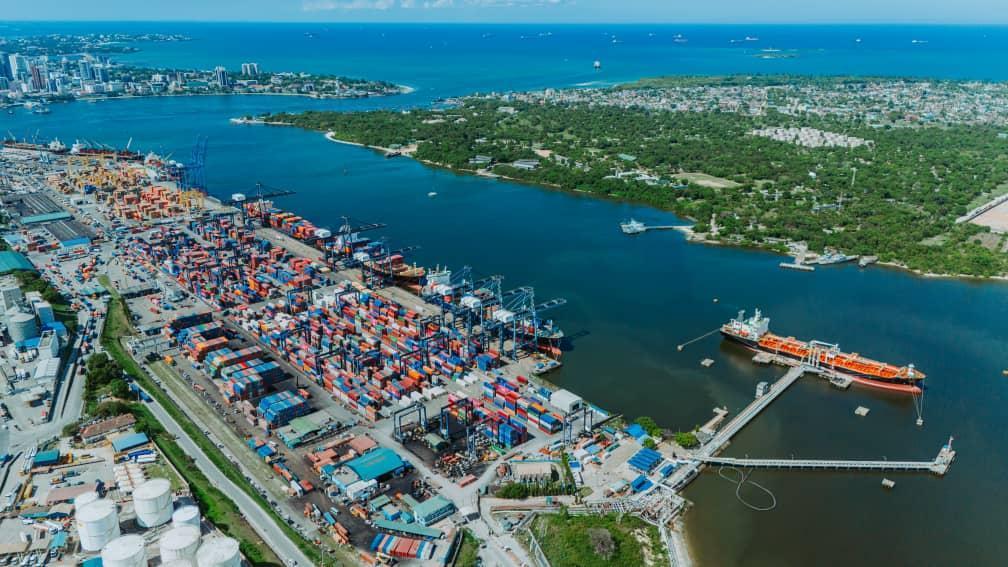Africa-Press – Uganda. Tanzania East Africa Gateway Terminal Limited (TEAGTL), the private operator of Terminal 2 has successfully implemented the Fixed Berthing Windows (FBW) concept at the Dar es Salaam Port.
This operational reform is being hailed as a transformational step in the modernization of Tanzania’s maritime logistics sector, with far-reaching benefits for manufacturers, exporters, and regional trade corridors.
Infusing Structure and Predictability of Shipments through Dar es Salaam Port FBW introduces a structured system of pre-assigned berthing slots, replacing the traditional first-come-first-served arrangement.
Considered as an industry best practise, the concept of Fixed Berthing Window (FBW) aims to reduce waiting time for vessels and accelerate cargo movement through the port of Dar es Salam. The result is enhanced predictability, reduced vessel waiting times, and improved coordination between shipping lines, logistics providers, and cargo owners.
With the first-come-first-served arrangement for handling vessels being riddled with inefficiencies and causing congestion and a long queue of vessels waiting outside the port, TEAGTL was keenly cognisant of the need to improve this aspect of the port’s performance.
In the last three months alone, out of 65 vessels handled by TEAGTL at Terminal 2, out of which more than 32% were served under Fixed Berthing Windows, with the proportion progressively increasing each month, to reach 48% in March – a remarkable achievement in such a short span.
The terminal now aims to scale this up to 75% FBW coverage by the end of May, indicative of strong adoption by major shipping lines and growing confidence in the system.
“The introduction of the FBW concept marks a significant milestone in enhancing efficiency, and service delivery in our maritime ports sector, strengthening our competitiveness as a regional trade hub. It is a testament to TPA’s unwavering commitment in partnering with TEAGTL as a private entity in view of developing a world-class port ecosystem at the Dar es Salaam Port that accelerates Tanzania’s trade and economic growth to support our broader vision of national development,” said Mr. Plasduce Mkeli Mbossa, Director General, Tanzania Ports Authority.
The Director General, Tanzania Shipping Agencies Corporation (TASAC), Mohamed Salum described the innovation as a notable stride towards efficiency, transparency, and predictability.
“This initiative directly supports TASAC’s mandate to regulate and promote safe, secure, and environmentally sound shipping practices, enhancing Tanzania’s competitiveness in global trade. This progress is vital to our vision of fostering a resilient, well-regulated maritime industry,” he said.
According to Shahzad Athar, Director, Tanzania East Africa Gateway Terminal Limited, the new innovation is not just a terminal improvement but rather a shift in the way trade is facilitated at the national level.
“Our efforts are aimed at the Tanzanian manufacturing and perishables sectors—to build a competitive advantage through supply chain visibility for exporters and importers, reduce inventory levels, and make Tanzanian products more competitive in global markets. Ultimately, our goal is to create the confidence and efficiency needed for shipping lines to build more tonnage into and out of Tanzania,” he said.
The CEO of Tanzania East Africa Gateway Terminal Limited, Capt. Jeyaraj Thamburaj described the success of the FBW concept as a remarkable testimonial to the dedication and efforts of their team.
“ By providing fixed and predictable berthing schedules, FBW is already helping to reduce vessel waiting times and improve overall port performance. To complement this, we are also expanding our reefer plug capacity to meet the growing demand for cold-chain logistics. This is particularly important for high-value agricultural exports like avocadoes, where reliability and freshness are critical. Together, FBW and enhanced reefer infrastructure will support Tanzanian exporters to expand in global markets,” he said.
Officials said the reform is also a game-changer for the manufacturing and industrial sectors are among the biggest beneficiaries of this reform.
They said, with FBW in place, importers, exporters can better synchronize production with vessel schedules, improve delivery timelines, and reduce importation and explorational costs associated with inventory, storage, and demurrage.
The result is stronger export competitiveness and more efficient integration into global value chains.
For More News And Analysis About Uganda Follow Africa-Press






